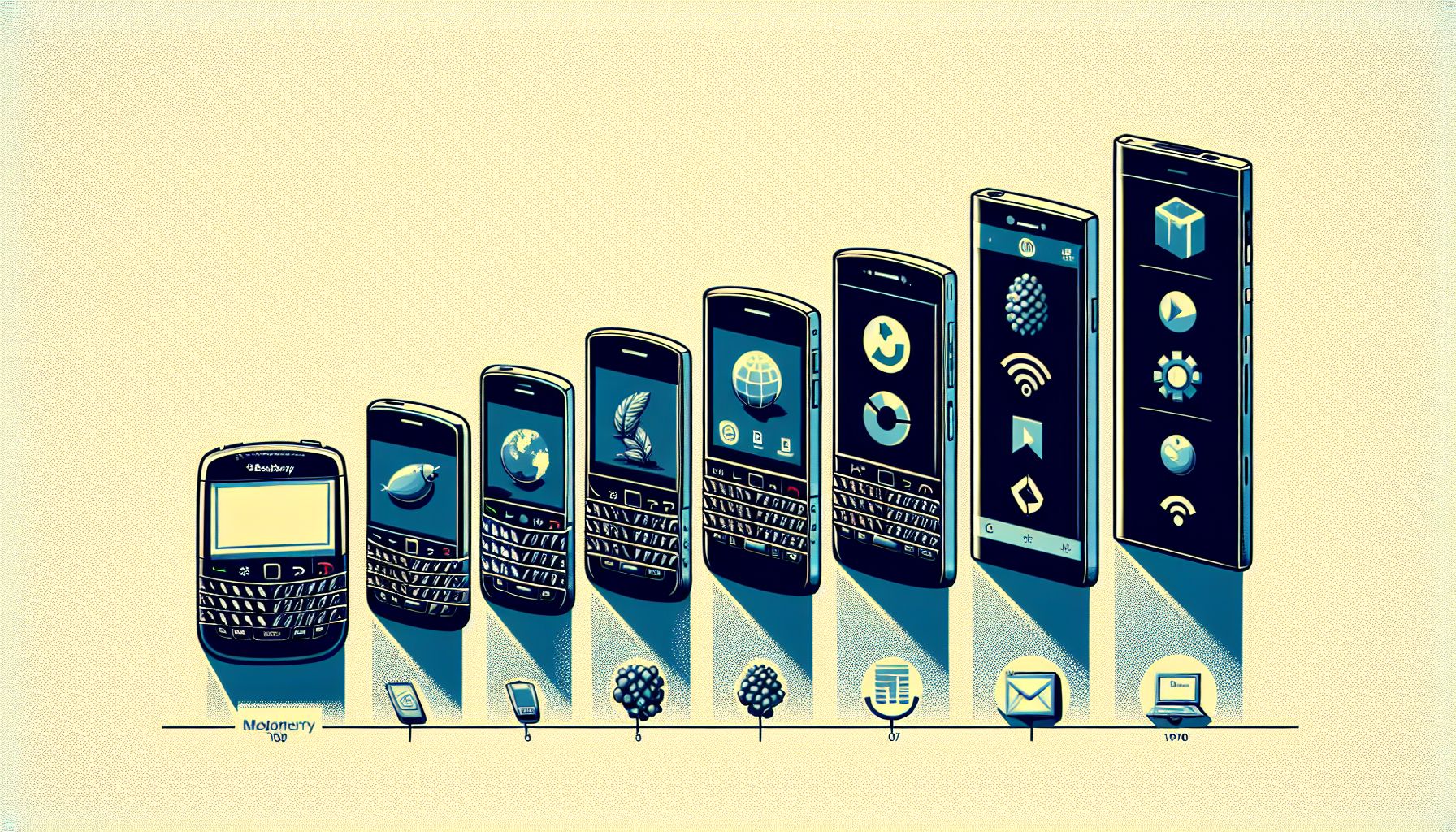📌 Let’s explore the topic in depth and see what insights we can uncover.
⚡ “Before Apple and Samsung took over, there was a little-known titan named Blackberry that ruled the mobile world. Buckle up as we take a nostalgic ride back to the dawn of the smartphone era that reshaped our lives forever!”
In the digital age, our lives have been profoundly reshaped by the advent of technological marvels. One of the most significant game-changers has been the smartphone. A device that began as a mere communication tool has rapidly developed into a multi-faceted instrument, serving as our camera, our office, our entertainment center, and much more. In this blog post, we will embark on a historical journey, tracing the revolutionary impact of smartphones, starting from the iconic Blackberry and the early mobile operating systems (OS).
🍇 Blackberry: A Pioneer in the Smartphone World

Charting the Smartphone Revolution: From Blackberry Onwards
Blackberry, a name synonymous with early smartphones, was the brainchild of a Canadian company, Research In Motion (RIM). Launched in 2003, the Blackberry 6210 was a breakthrough in mobile technology, offering features like email, web browsing, and a built-in keyboard. This was at a time when most cell phones were primarily used for calling and texting. The Blackberry’s unique selling point was its secure email service. With its end-to-end encryption, it quickly became a favorite among corporate users and government officials. The ease of typing on a physical QWERTY keyboard, combined with its robust security features, made Blackberry a trailblazer in the mobile world. However, as the smartphone market evolved, Blackberry faced stiff competition. The emergence of touchscreens, app-based ecosystems, and consumer-centric interfaces propagated by rivals saw a shift in user preferences. Blackberry’s market share dwindled, but its legacy as a pioneer in smartphone technology remains undeniable.
🔄 Early Mobile Operating Systems: The Foundation Stone
The early 2000s witnessed the birth of several mobile operating systems, each contributing to shaping the smartphone landscape. Here are a few notable ones:
Symbian OS
Released in 2001, Symbian was a flexible, user-friendly OS developed by Nokia. It was the most popular smartphone OS until 2010, thanks to Nokia’s global market dominance. Symbian paved the way for features we take for granted today, such as easy software installation, multitasking, and robust security.
Windows Mobile
Microsoft’s foray into the mobile OS market came in the form of Windows Mobile. It offered a familiar interface for PC users, complete with Start Menu and support for Microsoft Office applications. However, it struggled to keep pace with the rapidly evolving smartphone market.
Palm OS
Known for its simplicity and ease of use, Palm OS was a popular choice for Personal Digital Assistants (PDAs) and early smartphones. Its pen-based gesture system was ahead of its time, foreshadowing future touchscreen interfaces. These early operating systems provided the groundwork for the modern smartphone experience. Their development highlighted the need for a user-friendly interface, robust security, and the ability to run multiple applications simultaneously.
🍎 iOS and Android: The Game Changers
The launch of Apple’s iOS in 2007 marked a paradigm shift in the smartphone industry. The iPhone, with its sleek design, user-friendly interface, and groundbreaking multi-touch capability, was a runaway success. iOS introduced the concept of an app-based ecosystem through the App Store, transforming smartphones into versatile, multi-purpose devices. Hot on iOS’s heels came Google’s Android in 2008. Android offered a unique proposition: an open-source, customizable operating system that could be adapted by various phone manufacturers. This flexibility, combined with Google’s robust suite of services (Gmail, Google Maps, etc.), propelled Android to its current position as the world’s most popular mobile OS. Both iOS and Android have continued to innovate, introducing features like voice assistants (Siri and Google Assistant), augmented reality, and advanced camera capabilities. Their competition has fostered a dynamic, ever-evolving smartphone market, pushing the boundaries of what our pocket-sized devices can do.
📱 Smartphones: Impact Beyond Communication
The evolution from Blackberry to modern smartphones has had a profound impact on society, influencing our daily lives in numerous ways:
Digital Connectivity
Smartphones have made communication instantaneous and borderless, bringing people closer regardless of geographical boundaries.
Information Access
With a smartphone, the entire internet is at our fingertips, providing unprecedented access to information and knowledge.
Entertainment
From streaming movies and music to playing games, smartphones have become our personal entertainment centers.
Productivity
With apps for everything from note-taking to project management, smartphones serve as portable offices, boosting productivity.
E-commerce and Finance
Smartphones have revolutionized shopping and personal finance, enabling mobile payments, online banking, and e-commerce.
🧭 Conclusion
The smartphone revolution, initiated by pioneers like Blackberry and early mobile OS, has reshaped our world. From the way we communicate, work, play, shop, and even bank, the impact of this pocket-sized device is profound and far-reaching. The journey of smartphones, from Blackberry’s email-centric device to modern iOS and Android devices with extensive capabilities, is a testament to human ingenuity and innovation. It’s a journey that continues to surprise us, as technology pushes the boundaries of what’s possible. As we look to the future, one thing is clear: our smartphones will continue to play a central role, evolving in ways we can only imagine. So, the next time you pick up your smartphone, take a moment to appreciate the technological marvel in your hand. It’s not just a device; it’s a testament to human progress, a symbol of how far we’ve come, and a hint of where we’re going.
⚙️ Join us again as we explore the ever-evolving tech landscape.
